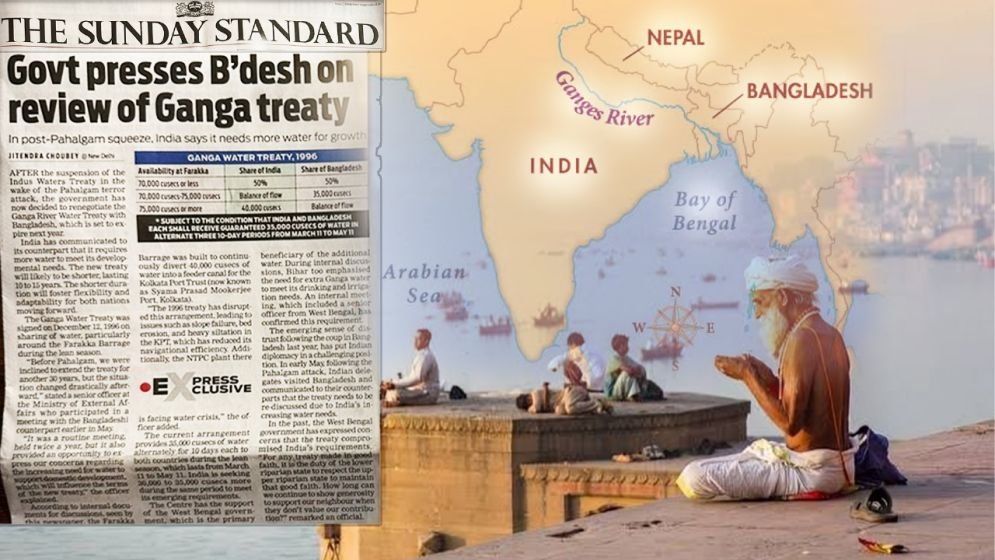Location: New Delhi, Dhaka
Date: June 24, 2025
Category: International Relations | Environment | South Asia Affairs
Ganga Water Treaty with Bangladesh to be renegotiated by India — What’s at Stake?
The Government of India is preparing to initiate renegotiations on the historic Ganga Water Sharing Treaty with Bangladesh, a landmark water-sharing agreement signed in 1996 that governs the distribution of the Ganga River waters at the Farakka Barrage. This development signals a significant geopolitical move and has raised both anticipation and apprehension across diplomatic, environmental, and regional development circles in South Asia.
Background: What Is the Ganga Water Treaty?
The Ganga Water Sharing Treaty, signed for 30 years in December 1996 between then Indian Prime Minister H.D. Deve Gowda and Bangladesh Prime Minister Sheikh Hasina, allocated water from the Ganga at the Farakka Barrage based on seasonal flows. Under this agreement:
- India retains control of the barrage.
- Bangladesh is guaranteed a minimum water share during the dry season (January to May), a critical period for agriculture.
- A Joint River Commission (JRC) was established for oversight and data sharing.
However, with changing climate patterns, increased water stress, and demographic pressures, the treaty has come under renewed scrutiny in both countries.
Why Is India Seeking Renegotiation Now?
- Climate Change & Depleting Flows:
The flow of the Ganga during the dry season has reduced due to upstream glacier melt, erratic rainfall, and over-extraction. This is impacting the effectiveness of the treaty’s water allocation formulas. - Rising Demands in Northern India:
Indian states like Uttar Pradesh, Bihar, and West Bengal are experiencing water scarcity for agriculture and industry, creating domestic pressure to revisit water-sharing priorities. - Geopolitical Considerations:
As China advances its dam-building projects on transboundary rivers, India aims to secure stronger regional cooperation with Bangladesh on water resources to ensure strategic stability. - Upcoming Expiry of the 30-Year Treaty in 2026:
With the treaty due to expire next year, India is eager to renegotiate terms that are adaptive to future hydrological and geopolitical realities.
How Is Bangladesh Responding?
The Bangladeshi government, led by Prime Minister Sheikh Hasina, has acknowledged the importance of renegotiation but emphasised:
- Fair and equitable distribution of Ganga waters remains a sovereign priority.
- Concerns over decreasing water flow during critical agricultural seasons, affecting rice production and fisheries in regions like Rajshahi and Khulna.
- Bangladesh is also calling for the inclusion of other shared rivers, such as the Teesta and Feni, in broader water cooperation dialogues.
Experts in Dhaka have urged for greater data transparency, climate-resilient clauses, and regional water governance frameworks to be integrated into any new treaty.
Broader Implications for the Region
- India-Bangladesh Relations:
While both nations share a cordial and cooperative relationship, water issues are sensitive flashpoints, especially with elections approaching in both countries. - Environmental Impact:
The renegotiation could lead to modernised water-sharing protocols based on real-time flow data, climate predictions, and ecological balance. - Role of China and Other Neighbours:
Water-sharing treaties are increasingly seen as strategic tools in South Asia, especially with upstream nations like China controlling the Himalayan river sources.
Expert Opinions
“This is an opportunity for both countries to move from a volume-based approach to a flow-based and ecological model of water sharing,” said Dr. Rajeev Ranjan, a South Asian water governance expert.
“We need to factor in climate volatility, seasonal uncertainties, and local livelihood dependencies, which were not as pronounced in the 1990s,” said Prof. Amena Noor from Dhaka University.
What Could the New Treaty Include?
- Dynamic water allocation based on real-time river discharge data
- Joint climate impact studies and hydrological forecasting
- Shared investment in river conservation and pollution control
- Expansion of cooperation to Teesta, Feni, and other transboundary rivers
- Setting up permanent water dispute resolution mechanisms
Conclusion
The upcoming talks between India and Bangladesh over the Ganga Water Treaty represent a pivotal moment in regional water diplomacy. As both countries prepare to navigate a future shaped by climate stress and strategic imperatives, a forward-looking, sustainable, and equitable water-sharing arrangement could redefine bilateral trust and South Asian river governance for decades to come.
GangaWaterTreaty #IndiaBangladesh #WaterSharing #ClimateChange #SouthAsiaDiplomacy #TeestaRiver #FarakkaBarrage #GangaRiver #WaterSecurity #Geopolitics

